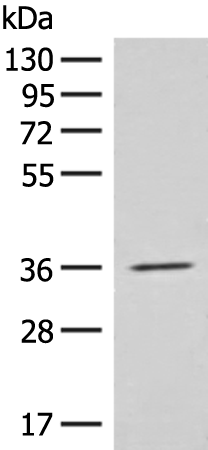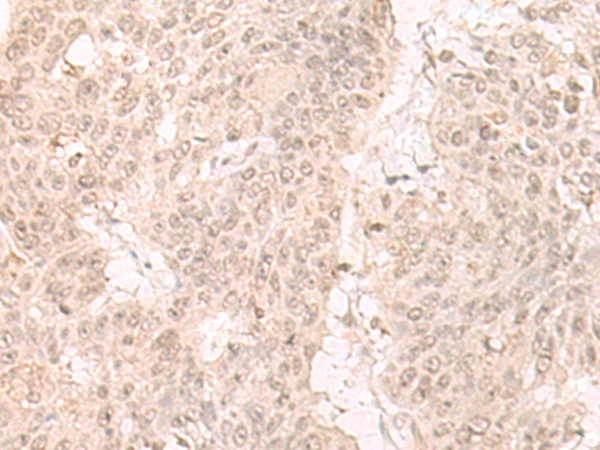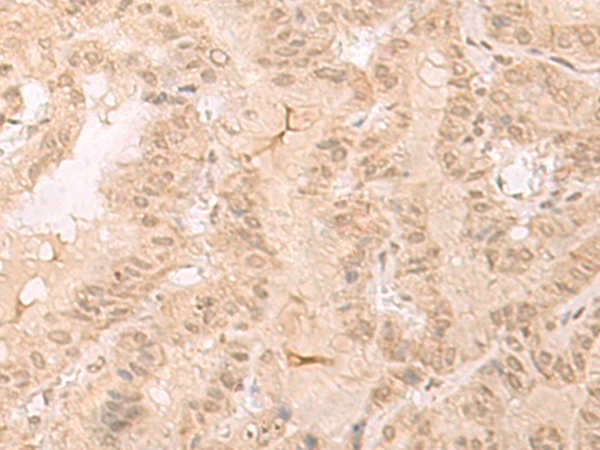


| WB | 咨询技术 | Human,Mouse,Rat |
| IF | 咨询技术 | Human,Mouse,Rat |
| IHC | 1/30-1/150 | Human,Mouse,Rat |
| ICC | 技术咨询 | Human,Mouse,Rat |
| FCM | 咨询技术 | Human,Mouse,Rat |
| Elisa | 1/5000-1/10000 | Human,Mouse,Rat |
| Aliases | BRESI1 |
| WB Predicted band size | 37 kDa |
| Host/Isotype | Rabbit IgG |
| Antibody Type | Primary antibody |
| Storage | Store at 4°C short term. Aliquot and store at -20°C long term. Avoid freeze/thaw cycles. |
| Species Reactivity | Human |
| Immunogen | Synthetic peptide of human EPSTI1 |
| Formulation | Purified antibody in PBS with 0.05% sodium azide and 50% glycerol. |
+ +
以下是3篇关于EPSTI1抗体的参考文献概览:
---
1. **文献名称**:*EPSTI1 promotes breast cancer metastasis through activation of EMT programs*
**作者**:Rasmussen MH et al.
**摘要**:该研究通过Western blot和免疫组化实验,证实EPSTI1抗体检测到其在乳腺癌细胞中的高表达,并揭示其通过激活上皮间质转化(EMT)促进肿瘤转移的分子机制。
---
2. **文献名称**:*EPSTI1 modulates antiviral innate immunity by targeting RIG-I signaling*
**作者**:Zhang Y et al.
**摘要**:利用EPSTI1特异性抗体进行免疫共沉淀(Co-IP),研究发现EPSTI1通过与RIG-I通路相互作用抑制干扰素产生,为病毒免疫逃逸提供了新解释。
---
3. **文献名称**:*EPSTI1 as a biomarker for chemoresistance in colorectal cancer*
**作者**:Wang L et al.
**摘要**:通过流式细胞术和免疫荧光技术,该文献发现EPSTI1高表达与奥沙利铂耐药相关,其抗体检测结果可作为预测化疗反应的潜在标志物。
---
4. **文献名称**:*EPSTI1 drives hepatocellular carcinoma progression via Wnt/β-catenin activation*
**作者**:Li X et al.
**摘要**:研究利用EPSTI1抗体进行组织芯片分析,证明其在肝癌中异常表达,并通过激活Wnt通路促进肿瘤增殖和侵袭,提示其作为治疗靶点的潜力。
---
以上文献均通过EPSTI1抗体进行蛋白水平验证,涵盖肿瘤转移、免疫调控及耐药机制等领域。如需具体期刊或年份,可进一步补充检索条件。
The EPSTI1 (Epithelial Stromal Interaction 1) antibody is a tool used to detect the EPSTI1 protein, a member of the serine/arginine-rich (SR) protein family involved in RNA splicing and cellular processes. EPSTI1 is encoded by the *EPSTI1* gene, located on human chromosome 13q13.3. and is notably expressed in epithelial cells and stromal fibroblasts. It plays a role in epithelial-stromal interactions, particularly in inflammatory and tumor microenvironments. Research highlights its overexpression in cancers, such as breast cancer, where it promotes metastasis by enhancing epithelial-mesenchymal transition (EMT) and activating matrix metalloproteinases (MMPs). EPSTI1 also interacts with the NF-κB signaling pathway, modulating immune responses and inflammation.
The EPSTI1 antibody is essential for studying its expression patterns, localization, and mechanistic roles in disease models. It is commonly used in techniques like Western blotting, immunohistochemistry (IHC), and immunofluorescence (IF) to validate protein levels in tissues or cell lines. Commercial antibodies are typically validated for specificity via knockdown/knockout controls. Researchers employ EPSTI1 antibodies to explore its potential as a biomarker or therapeutic target in cancer and inflammatory disorders. Ongoing studies focus on its dual roles in tumor progression and immune regulation, underscoring its relevance in translational research.
×